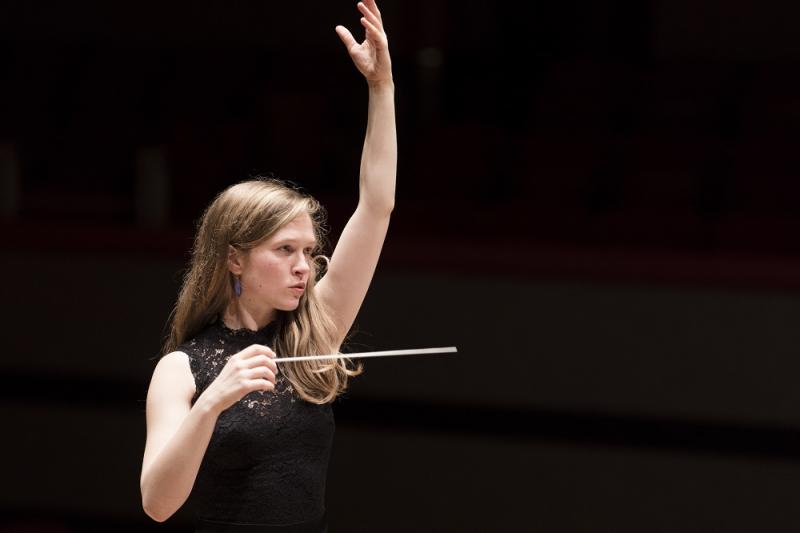Gringytė, Williams, CBSO, Gražinytė-Tyla, Symphony Hall, Birmingham review - living in the moment | reviews, news & interviews
Gringytė, Williams, CBSO, Gražinytė-Tyla, Symphony Hall, Birmingham review - living in the moment
Gringytė, Williams, CBSO, Gražinytė-Tyla, Symphony Hall, Birmingham review - living in the moment
Lili Boulanger burns fierce and bright in a powerful centenary tribute

How to judge a genius who died at 25? Gerald Larner, in his programme note for this concert by the City of Birmingham Symphony Orchestra, suggests that Lili Boulanger’s tragically early death was actually central to her achievement. She knew she probably wouldn’t see 30, and directed her energies accordingly.
Those were precisely the qualities that Mirga Gražinytė-Tyla found in Boulanger’s setting of Psalm 24. It’s a flame-tongued vocal fanfare, and the CBSO Chorus matched the opening brass flourish in articulation and attack, singing with a tight, slightly nasal colour that it’d be lazy simply to call “Gallic”. Let’s just say that it was ideally suited to Boulanger’s blend of fervour and clarity. The short orchestral miniature D’un matin de printemps – one of the last works that Boulanger completed before succumbing to Crohn’s disease in March 1918 – bristled and shimmered like Ravel in verdant mood. Gražinytė-Tyla calmly held it up and let it revolve, with low pungent clarinets and prickly strings catching both light and shade.
For the Pie Jesu of 1918 – Boulanger’s very last completed work, which she dedicated on her deathbed to her sister Nadia – the CBSO Children’s Chorus floated an aching, eerily chromatic line high above a tormented landscape of organ and keening solo strings. The slightest hint of self-consciousness would have tipped it into outright anguish: Gražinytė-Tyla simply let it sing itself out. In fact, the lack of fussiness and the sense of a shared experience made this concert feel rather like a belated sequel to Gražinytė-Tyla’s Birmingham Debussy Festival in March. The whole CBSO extended family was here. Orchestra, Chorus, and the Children’s Chorus in their pink shirts were all piled high onto the Symphony Hall stage, and were enthusiastically greeted by a capacity audience that was clearly quite willing to follow this particular team into even as dark a corner of Boulanger’s world as the massive, louring Psalm 130 that ended the first half.  “Out of the abyss, I cry to thee” begins the text; and that’s where it ends, too: returning with grim resolution to the depths amidst sombre glints of harp and celeste. The CBSO Chorus, initially blanched in tone, was soon surfing hectic full orchestral climaxes with apocalyptic ferocity, and Gražinytė-Tyla handled her huge forces as if they were a single instrument. When the soloist (the mezzo Justina Gringytė, pictured above) climbed beseechingly towards heaven, the women of the chorus seemed to merge with her beam of tone; whereupon Gražinytė-Tyla sent the violins arching after them. Boulanger’s vision is so passionate, and yet (in parts) so bleak that it could easily be unbearable. Here, it burned with a fierce, illuminating flame.
“Out of the abyss, I cry to thee” begins the text; and that’s where it ends, too: returning with grim resolution to the depths amidst sombre glints of harp and celeste. The CBSO Chorus, initially blanched in tone, was soon surfing hectic full orchestral climaxes with apocalyptic ferocity, and Gražinytė-Tyla handled her huge forces as if they were a single instrument. When the soloist (the mezzo Justina Gringytė, pictured above) climbed beseechingly towards heaven, the women of the chorus seemed to merge with her beam of tone; whereupon Gražinytė-Tyla sent the violins arching after them. Boulanger’s vision is so passionate, and yet (in parts) so bleak that it could easily be unbearable. Here, it burned with a fierce, illuminating flame.
So it’s no discourtesy to Fauré’s Requiem – still less a concession to those who’d relegate it to a Classic FM relaxation CD – to say that it felt like balm by comparison. The CBSO Chorus under its director Simon Halsey is an instrument of sometimes overwhelming power and precision, but the CBSO’s associate chorus director Julian Wilkins had prepared this performance, and he’d subtly remodelled their sound: rounding off hard edges, clarifying massed sonorities and – without sacrificing focus or purity of tone – giving everything a tender radiance that suited this music exquisitely. Musical line and text were phrased as one, the sopranos’ Lux aeterna glowed like a halo, and the opening lines of the Offertoire became a graceful, hovering tracery of interlocking lines. Credit for that goes to Gražinytė-Tyla too, of course. She’d opted for the version in which violas replace all but a single violin, and used the orchestra as the performance’s motor – laying down a framework in which choir and soloist (Roderick Williams, singing with openhearted candour) could simply unfold the work’s message of consolation.
A conductor doesn’t need to be demonstrative to create a sense of occasion, and in Birmingham, at any rate, Gražinytė-Tyla knows that. On a purely musical level, a couple of her ideas misfired slightly. Leader Sharon Roffman played the violin solo in the Sanctus from high in the choir stalls – beautifully but with some loss of audibility – and the soprano solo in the Pie Jesu was sung by the entire children’s chorus – again, beautifully, but at the expense of the intimacy that comes with a solo voice. But in this hall, and on this evening, the audience responded, as Gražinytė-Tyla (knowing her home crowd) must have guessed they would. And what else really matters? Lili Boulanger understood music’s capacity to find eternity in the here and now. Increasingly, that seems to be at the centre of Gražinytė-Tyla’s artistry, too – which can only be healthy.
rating
Share this article
Add comment
The future of Arts Journalism
You can stop theartsdesk.com closing!
We urgently need financing to survive. Our fundraising drive has thus far raised £49,000 but we need to reach £100,000 or we will be forced to close. Please contribute here: https://gofund.me/c3f6033d
And if you can forward this information to anyone who might assist, we’d be grateful.

Subscribe to theartsdesk.com
Thank you for continuing to read our work on theartsdesk.com. For unlimited access to every article in its entirety, including our archive of more than 15,000 pieces, we're asking for £5 per month or £40 per year. We feel it's a very good deal, and hope you do too.
To take a subscription now simply click here.
And if you're looking for that extra gift for a friend or family member, why not treat them to a theartsdesk.com gift subscription?
more Classical music
 Hallé John Adams festival, Bridgewater Hall / RNCM, Manchester review - standing ovations for today's music
From 1980 to 2025 with the West Coast’s pied piper and his eager following
Hallé John Adams festival, Bridgewater Hall / RNCM, Manchester review - standing ovations for today's music
From 1980 to 2025 with the West Coast’s pied piper and his eager following
 Kaploukhii, Greenwich Chamber Orchestra, Cutts, St James's Piccadilly review - promising young pianist
A robust and assertive Beethoven concerto suggests a player to follow
Kaploukhii, Greenwich Chamber Orchestra, Cutts, St James's Piccadilly review - promising young pianist
A robust and assertive Beethoven concerto suggests a player to follow
 Robin Holloway: Music's Odyssey review - lessons in composition
Broad and idiosyncratic survey of classical music is insightful but slightly indigestible
Robin Holloway: Music's Odyssey review - lessons in composition
Broad and idiosyncratic survey of classical music is insightful but slightly indigestible
 Classical CDs: Wolf-pelts, clowns and social realism
British ballet scores, 19th century cello works and contemporary piano etudes
Classical CDs: Wolf-pelts, clowns and social realism
British ballet scores, 19th century cello works and contemporary piano etudes
 Bizet in 150th anniversary year: rich and rare French offerings from Palazzetto Bru Zane
Specialists in French romantic music unveil a treasure trove both live and on disc
Bizet in 150th anniversary year: rich and rare French offerings from Palazzetto Bru Zane
Specialists in French romantic music unveil a treasure trove both live and on disc
 Scottish Chamber Orchestra, Ibragimova, Queen’s Hall, Edinburgh review - rarities, novelties and drumrolls
A pity the SCO didn't pick a better showcase for a shining guest artist
Scottish Chamber Orchestra, Ibragimova, Queen’s Hall, Edinburgh review - rarities, novelties and drumrolls
A pity the SCO didn't pick a better showcase for a shining guest artist
 Kilsby, Parkes, Sinfonia of London, Wilson, Barbican review - string things zing and sing in expert hands
British masterpieces for strings plus other-worldly tenor and horn - and a muscular rarity
Kilsby, Parkes, Sinfonia of London, Wilson, Barbican review - string things zing and sing in expert hands
British masterpieces for strings plus other-worldly tenor and horn - and a muscular rarity
 From Historical to Hip-Hop, Classically Black Music Festival, Kings Place review - a cluster of impressive stars for the future
From quasi-Mozartian elegance to the gritty humour of a kitchen inspection
From Historical to Hip-Hop, Classically Black Music Festival, Kings Place review - a cluster of impressive stars for the future
From quasi-Mozartian elegance to the gritty humour of a kitchen inspection
 Shibe, LSO, Adès, Barbican review - gaudy and glorious new music alongside serene Sibelius
Adès’s passion makes persuasive case for the music he loves, both new and old
Shibe, LSO, Adès, Barbican review - gaudy and glorious new music alongside serene Sibelius
Adès’s passion makes persuasive case for the music he loves, both new and old
 Anja Mittermüller, Richard Fu, Wigmore Hall review - a glorious hall debut
The Austrian mezzo shines - at the age of 22
Anja Mittermüller, Richard Fu, Wigmore Hall review - a glorious hall debut
The Austrian mezzo shines - at the age of 22
 First Person: clarinettist Oliver Pashley on the new horizons of The Hermes Experiment's latest album
Compositions by members of this unusual quartet feature for the first time
First Person: clarinettist Oliver Pashley on the new horizons of The Hermes Experiment's latest album
Compositions by members of this unusual quartet feature for the first time

Comments
Fantastic Boulanger, but a